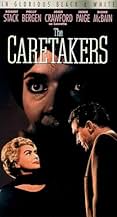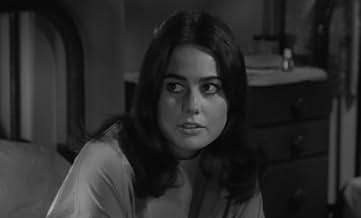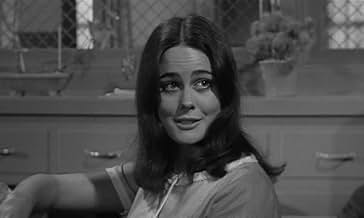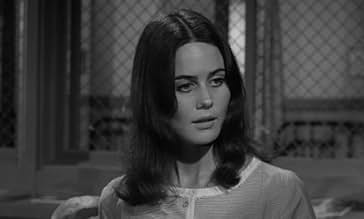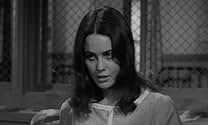CALIFICACIÓN DE IMDb
5.5/10
966
TU CALIFICACIÓN
Drama médico sobre pacientes con enfermedades mentales y sus cuidadores, y las nuevas sesiones de terapia grupal que buscan reemplazar los tratamientos tradicionales de contención física y e... Leer todoDrama médico sobre pacientes con enfermedades mentales y sus cuidadores, y las nuevas sesiones de terapia grupal que buscan reemplazar los tratamientos tradicionales de contención física y electroshock.Drama médico sobre pacientes con enfermedades mentales y sus cuidadores, y las nuevas sesiones de terapia grupal que buscan reemplazar los tratamientos tradicionales de contención física y electroshock.
- Dirección
- Guionistas
- Elenco
- Nominado a 1 premio Óscar
- 5 nominaciones en total
Ana María Lynch
- Ana
- (as Ana St. Clair)
Pamela Austin
- Student Nurse
- (sin créditos)
Brian Corcoran
- Tony
- (sin créditos)
George DeNormand
- Doctor
- (sin créditos)
Opiniones destacadas
I find this one of the most difficult films of its era to sit through; it is truly nerve-bending, asinine, and infuriating. if you look upon it as camp, it still is difficult to take unless you like the sight of bizarre creature polly bergen constantly throwing fits and screaming (it's truly horrific) and can tolerate the posturing hero and a story and scenes which purport to shed light on mental illness but is totally phony in every particular. diane mcbain is gorgeous and smug; joan crawford and constance ford as butch as they come; janis paige gives the most enjoyable performance in the film, or at least creates a somewhat believable character till she phonies out toward the end. it's pathetic that maltin and others would even consider taking this film seriously. it is a fairy tale put together by fly-by-night producers for a quick buck who wanted to make it look like one of those 50's/early 60's "message" social reform pictures, and people were dumb enough to accept that.
I'm clearly not on the same page as most of the reviewers. First, it's classic Joan Crawford camp. Not only is Joan campy and hilarious as the "head nurse" but the cast of characters kept me enthralled. Look, I don't expect too much "realism" in films about mental illness in the 1960's so I'm not quite getting the disgust that's being expressed.
Marion was also a special treat and her energy shined.
If there is any historical relevance in it is the fact the social norms around the mentally ill were being reconstructed in the 1960's. Not that there was any real legitimacy in how it was portrayed, the fact that it was part of the movie as evidenced by the "borderlines". Even the term "borderlines" is made up, but the point about the conception of the mentally ill having capacity to heal was discussed. I guess 'borderline' was meant to express "only borderline insane".
Look, if you love a good camp film film with great outrageous female characters, this is a great film to watch. A special bonus for those that love Joan Crawford!
Marion was also a special treat and her energy shined.
If there is any historical relevance in it is the fact the social norms around the mentally ill were being reconstructed in the 1960's. Not that there was any real legitimacy in how it was portrayed, the fact that it was part of the movie as evidenced by the "borderlines". Even the term "borderlines" is made up, but the point about the conception of the mentally ill having capacity to heal was discussed. I guess 'borderline' was meant to express "only borderline insane".
Look, if you love a good camp film film with great outrageous female characters, this is a great film to watch. A special bonus for those that love Joan Crawford!
Ah, crazy people movies. Nothing actors like better than free range to ham it up under the guise of being insane. You know what's really sad? Fifty years later and the portrayal of mentally ill people in movies really hasn't changed much. Anyway, this movie is a drama about the goings-on at a hospital mental ward. In particular doctor Robert Stack, who tackles his greatest "unsolved mystery" in this film: Joan Crawford. Joan plays a hard-nosed head nurse named Lucretia who doesn't like softie Stack's approach to dealing with the loonies. Dated and often silly, it can be a tough slog to sit through. But whenever Joan's on screen, things are more interesting. Seeing Joan in a leotard teaching her nurses self-defense is a must for every Joan fan! I see several reviews comparing this to The Snake Pit, which I find ridiculous. The Snake Pit was a million times better than this. This is a forgettable drama with good intentions that is only memorable for Joan Crawford's supporting part.
Sixteen years after The Snake Pit and 13 years before One Flew Over The Cuckoo's Nest, The Caretakers joins their company as `enlightened' explorations of the mentally ill and the institutions that hold them. But The Caretakers stays closer in spirit to Caged, with the female inmates transferred from the Big House to a mental ward called (of all things!) Borderline. (There's actually one holdover from the cast of Caged Ellen Corby, as a batty old schoolmarm and one sequence involving a parakeet which almost exactly reprises one involving a cat in the earlier movie.) But while Caged was overwrought but compellingly good, The Caretakers is overwrought and compellingly bad.
The jangly piano music over the titles, with their suggestions of Di Chirico and Picasso's `Guernica,' clue us to the racheted-up, `serious' tone of the movie. But soon we're watching Polly Bergen go flat-out berserk in front of the screen of a crowded theater. An ambulance ushers her into the gloomy shadows (the movie is well photographed) of the mental hospital, where she comes under the care of Robert Stack, who is pioneering progressive and humane methods of treatment (which nonetheless require jolts of electricity to the temples).
But Bergen is but one of the woeful women among whom we divide our time. This is the kind of dramaturgy where, when Barbara Barrie is introduced as never having uttered a word in seven years, we wait 90 minutes with bated breath for her to speak. She's lucky to get a word in edgewise, as recovering prostitute Janis Paige bazoos her way through every scene she's in and steals all the thunder from Bergen's go-for-broke histrionics.
The staff faces its own problems, however. Head of the hospital is Herbert Marshall, looking like he was just trundled in from Madame Tussaud's, but he's just a figurehead who has long since ceded authority to underlings, particularly Joan Crawford. Since she's been saddled with the name Lucretia, with nasty echoes of the Borgias, we know she's not exactly a helping professional. She stands in adamant opposition to everything Stack works for, and relies on head nurse and hard case Constance Ford as her secret agent. Unfortunately, Crawford's role is smaller than we can be sure she hoped it would be (and often her position seems to make sense).
That's about it. We never get to see a promised, climactic board meeting which will decide the fates of Crawford and Stack. That may have been a try for ironic ambiguity, but it looks like the movie just ran out of steam, or money. For some of the patients, rays of hope do pop out of the institutional-grey skies, for Hollywood never acknowledged a problem that couldn't be wrapped up by the last reel. This mixture of high earnestness and wretched overacting is simply stupefying.
The jangly piano music over the titles, with their suggestions of Di Chirico and Picasso's `Guernica,' clue us to the racheted-up, `serious' tone of the movie. But soon we're watching Polly Bergen go flat-out berserk in front of the screen of a crowded theater. An ambulance ushers her into the gloomy shadows (the movie is well photographed) of the mental hospital, where she comes under the care of Robert Stack, who is pioneering progressive and humane methods of treatment (which nonetheless require jolts of electricity to the temples).
But Bergen is but one of the woeful women among whom we divide our time. This is the kind of dramaturgy where, when Barbara Barrie is introduced as never having uttered a word in seven years, we wait 90 minutes with bated breath for her to speak. She's lucky to get a word in edgewise, as recovering prostitute Janis Paige bazoos her way through every scene she's in and steals all the thunder from Bergen's go-for-broke histrionics.
The staff faces its own problems, however. Head of the hospital is Herbert Marshall, looking like he was just trundled in from Madame Tussaud's, but he's just a figurehead who has long since ceded authority to underlings, particularly Joan Crawford. Since she's been saddled with the name Lucretia, with nasty echoes of the Borgias, we know she's not exactly a helping professional. She stands in adamant opposition to everything Stack works for, and relies on head nurse and hard case Constance Ford as her secret agent. Unfortunately, Crawford's role is smaller than we can be sure she hoped it would be (and often her position seems to make sense).
That's about it. We never get to see a promised, climactic board meeting which will decide the fates of Crawford and Stack. That may have been a try for ironic ambiguity, but it looks like the movie just ran out of steam, or money. For some of the patients, rays of hope do pop out of the institutional-grey skies, for Hollywood never acknowledged a problem that couldn't be wrapped up by the last reel. This mixture of high earnestness and wretched overacting is simply stupefying.
Robert Stack, Joan Crawford, Susan Oliver, Herbert Marshall, Constance Ford, Van Williams and Diane McBain are "The Caretakers," a 1963 film also starring Polly Bergen, Janis Paige, Barbara Barrie, Ellen Corby and Sharon Hugueny who are the cared for. Robert Vaughn plays Bergen's husband. The setting is a mental institution where Polly Bergen is brought after she goes insane at a theater showing West Side Story. She wasn't the first. The focus is on her case as the director of nurses (Crawford) and the doctor in charge of an experimental program (Stack) duke it out - naturally Crawford favors things like discipline and confinement (she would) and Stack wants to treat the patients as people and give them therapy. I don't know where the drugs were, unless they didn't have them in 1963. I'm pretty sure they had Librium, though Polly didn't seem to be on it.
This film has TV written all over it, including in its choice of the actors, most of whom did major work on television. It's not strong enough for a feature film, though it looks for all intents and purposes like a B movie which it perhaps was. Robert Stack is pretty one-note. Crawford in 1963 still looked good in a leotard but the rest of her is plenty scary. I'm not sure the portrayal of the conflict was correct in its dynamics - nurses have a certain amount of power but riding roughshod over a doctor's orders...I suppose with Crawford heading up the staff, it's more than possible but not realistic.
Janis Paige gives a lively performance as a man-hater, and there is the ubiquitous non-speaker (Barrie), the nice one (Corby), the delusional one (Hugueny), and the one who will probably recover (Bergen). Herbert Marshall plays the head of the institute - by 1963, he was 73 and had enjoyed 50 years on stage and in films. After a distinguished career, "The Caretakers" is thankfully not his last credit. Constance Ford played a nurse from hell who is not a credit to her profession. There were two hunks with the last name of Williams back in the day - Van and Grant - this one's Van. Nice eye candy but he didn't have much to do.
All in all, pretty badly directed and executed.
This film has TV written all over it, including in its choice of the actors, most of whom did major work on television. It's not strong enough for a feature film, though it looks for all intents and purposes like a B movie which it perhaps was. Robert Stack is pretty one-note. Crawford in 1963 still looked good in a leotard but the rest of her is plenty scary. I'm not sure the portrayal of the conflict was correct in its dynamics - nurses have a certain amount of power but riding roughshod over a doctor's orders...I suppose with Crawford heading up the staff, it's more than possible but not realistic.
Janis Paige gives a lively performance as a man-hater, and there is the ubiquitous non-speaker (Barrie), the nice one (Corby), the delusional one (Hugueny), and the one who will probably recover (Bergen). Herbert Marshall plays the head of the institute - by 1963, he was 73 and had enjoyed 50 years on stage and in films. After a distinguished career, "The Caretakers" is thankfully not his last credit. Constance Ford played a nurse from hell who is not a credit to her profession. There were two hunks with the last name of Williams back in the day - Van and Grant - this one's Van. Nice eye candy but he didn't have much to do.
All in all, pretty badly directed and executed.
¿Sabías que…?
- TriviaJoan Crawford went out of her way to help an aging Herbert Marshall with his lines. She also arranged to have his scenes filmed first so he could leave the set early in the day as he was an old friend and in ill health.
- ErroresAs Lorna runs into the hospital, there's nothing outside the door. But the shot from inside shows a small wall just outside the door which she would have had to jump over or go around to enter.
- ConexionesFeatured in Hollywood: The Great Stars (1963)
Selecciones populares
Inicia sesión para calificar y agrega a la lista de videos para obtener recomendaciones personalizadas
- How long is The Caretakers?Con tecnología de Alexa
Detalles
- Fecha de lanzamiento
- País de origen
- Idioma
- También se conoce como
- The Caretakers
- Locaciones de filmación
- Productora
- Ver más créditos de la compañía en IMDbPro
Taquilla
- Total en EE. UU. y Canadá
- USD 2,050,000
- Total a nivel mundial
- USD 3,160,000
- Tiempo de ejecución1 hora 37 minutos
- Color
- Relación de aspecto
- 1.66 : 1
Contribuir a esta página
Sugiere una edición o agrega el contenido que falta

Principales brechas de datos
By what name was Almas en tinieblas (1963) officially released in India in English?
Responda
